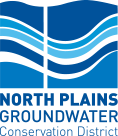FAQS
Q: I was at the coffee shop and I heard …
A: Anything you heard at the coffee shop or anywhere other than from a representative of the NPGCD may not be accurate. If you hear something, give us a call and ask if it is true. We are happy to answer any questions you might have.
Q: I drilled a new well on my joined Groundwater Production Unit. I will have to make costly changes to existing wells to be able to install a flow meter. Can I just meter the pivot and not the old wells?
A: If you drill a new well, you are required to install a flow meter at every existing well to be in compliance. The NPGCD has a meter reimbursement program available to assist with the cost of the flow meters, but other changes and costs associated with the completing of installing flow meters is at the owner’s expense. Failure to install flow meters on any well as required by NPGCD rules is a Class One violation of up to $10,000 per day per violation.
Q: Why can’t I use the beginning of the year and end of the year readings when reporting my Production by gas or electric meter?
A: The actual readings are raw readings and have some corrections made to them by gas or electric companies. What is actually required for the end reading is total million cubic feet (MCF) for the year for gas meters or total kilowatt hours used for the year for electric meters taken off the electric or gas bills. The beginning reading on these types of meters will always be zero. The supporting documents (monthly bills or summaries) must always accompany these type of reports.
Q: Why do I have to use installed flow meters to report my production when I have another reporting method which I prefer?
A: If you are required to have flow meters installed on your property, the District expects you to report with those meters. A backup metering method, however, is highly encouraged in case your flow meters do not operate properly or have not captured all of your water use for the year. In this case, the backup metering may be used, but the flow meters are expected to be repaired and used as soon as possible.
Q: When am I allowed to put flow meters on my pivot(s) when I drill a new well?
A: If the new well was drilled on a single section or portion of a section 640 acres or less and there are no adjoining (touching) sections you are associated with either by ownership, lease, management or re-establishment of a groundwater production unit, you are allowed to put the meters at the pivot(s) on that section.
Q: Why am I required to pay a late filing fee for filing my production reports after the deadline for submission?
A: There are close to 3,000 production reports which are normally mailed out in middle to late November. A filing due date of March 1 was set by the Board to give the producer adequate time to fill out reports and gather supporting documents as needed. Late filed or non-filed reports cause a delay in total production calculations which are required to be presented to the General Manager and the Board of Directors to plan for desired future conditions. The District has also historically refunded the fees paid for late filed reports if the fee is paid in a timely manner and the following year’s reports are filed by Jan 15.
Q: Why am I required to have an automatic low pressure drain installed on my check valves? They continuously leak.
A: The low pressure drain automatically opens when the well is shut down and prevents back flow into the aquifer which could cause contamination.
Q: May I drill a well or test hole before my permit is approved by the North Plains Groundwater Conservation District?
A: No. Drilling without an approved permit is Class One violation of NPGCD rules which can result in fines up to $10,000 per day per violation.
Q: Are my well permit fees or test hole permit fees refundable?
A: No, unfortunately well and test hole permit fees are nonrefundable.
Q: My brother and I each own an undivided interest in the groundwater rights of our property. He is out of town, but since I own an interest can I sign for him to obtain a permit or other documentation?
A: That depends. You can only sign for your brother if an Agent Authorization Form is on file with the NPGCD allowing you to do so. Otherwise, the answer is no. Your brother will be required to sign for the document as well.
Q: My neighbor and I joined our contiguous acreage and created a Groundwater Production Unit, but I farm the land. I would like to drill a test hole. Does my neighbor have to sign the permit?
A: Yes. If you intend to drill on your neighbor’s property, they will have to sign or file an Agent Authorization Form with the NPGCD allowing you to sign for them.
If you are interested in learning more please contact our office at 806-935-6401 or e-mail us at info@northplainsgcd.org
